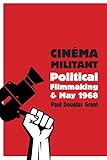Cinéma Militant : Political Filmmaking and May 1968 / Paul Douglas Grant.
Material type: TextPublisher: New York, NY : Columbia University Press, [2016]Copyright date: ©2016Description: 1 online resource (224 p.)Content type:
TextPublisher: New York, NY : Columbia University Press, [2016]Copyright date: ©2016Description: 1 online resource (224 p.)Content type: - 9780231176675
- 9780231851015
- 791.43/6581 23
- online - DeGruyter
- Issued also in print.
| Item type | Current library | Call number | URL | Status | Notes | Barcode | |
|---|---|---|---|---|---|---|---|
 eBook
eBook
|
Biblioteca "Angelicum" Pont. Univ. S.Tommaso d'Aquino Nuvola online | online - DeGruyter (Browse shelf(Opens below)) | Online access | Not for loan (Accesso limitato) | Accesso per gli utenti autorizzati / Access for authorized users | (dgr)9780231851015 |
Frontmatter -- Contents -- Acknowledgments -- Introduction -- Chapter 1. Wildcat Strikes and Wildcat Cinema in May '68: ARC (Atelier de recherche cinématographique) -- Chapter 2. Jean-Pierre Thorn: "No investigation, no right to speak" -- Chapter 3. Cinélutte: "Tout ce qui bouge est rouge" -- Chapter 4. Les groupes Medvedkine: Before and After Chris Marker -- Chapter 5. Of Theory and Peasants: Groupe Cinéthique -- Conclusion -- Notes -- Filmography -- Bibliography -- Index
restricted access online access with authorization star
http://purl.org/coar/access_right/c_16ec
This history covers the filmmaking tradition often referred to as cinéma militant, which emerged in France during the events of May 1968 and flourished for a decade. While some films produced were created by established filmmakers, including Chris Marker, Jean-Luc Godard, and William Klein, others were helmed by left-wing filmmakers working in the extreme margins of French cinema. This latter group gave voice to underrepresented populations, such as undocumented immigrants (sans papiers), entry-level factory workers (ouvriers spécialisés), highly intellectual Marxist-Leninist collectives, and militant special interest groups. While this book spans the broad history of this uncharted tradition, it particularly focuses on these lesser-known figures and works and the films of Cinélutte, Les groupes medvedkine, Atelier de recherche cinématographique, Cinéthique, and the influential Marxist filmmaker Jean-Pierre Thorn. Each represent a certain tendency of this movement in French film history, offering an invaluable account of a tradition that also sought to share untold histories.
Issued also in print.
Mode of access: Internet via World Wide Web.
In English.
Description based on online resource; title from PDF title page (publisher's Web site, viewed 02. Mrz 2022)


